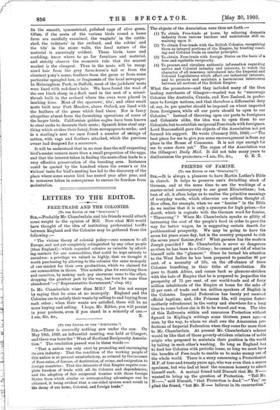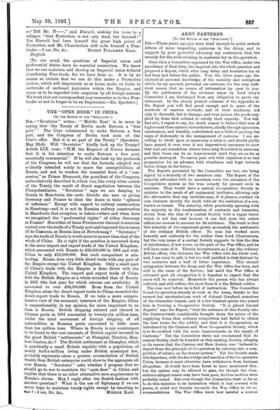FRIENDS OF FAMINE.
[To THE EDITOR OP THE "SPECTATOR." J Sin, It is always a pleasure to have Martin Luther's Bible in church. It helps to preserve one's dwindling stock of German, and at the same time to see the workings of a master-mind contemporary to our great Elizabethans ; but, best of all, it often helps us to realise the primitive meanings of everyday words, which otherwise are seldom thought of. How often, for example, when we see " famine " in the Bible do we realise that it is only a synonym for high prices,—for dearth, which is cognate with the German word for famine, " Theuerung" When Mr. Chamberlain speaks so glibly of increasing the cost of the people's food in order to pave the way for better wages, he is suggesting certain dearth for problematical prosperity. We may be going to have the seven fat years some day, but is the country prepared to risk the seven years' famine first ? What garners has the modern Joseph provided ? Mr. Chamberlain is never so dangerous as when he has been to a Colony ; he cannot get rid of what he himself calls the "glamour." Since he turned his attention to the West Indies he has been prepared to penalise 90 per cent. of a necessity of life, on the off-chance of these Colonies benefiting in their tithe of contribution. He goes to South Africa, and comes back so glamour-stricken with the halo of Empire that he is prepared to jeopardise the prosperity of 75 per cent. of Our world-trade and of forty million inhabitants of the Empire at home for the sake of 25 per cent. of trade and ten million speakers of English in the Colonies. Imperial Federation has barely yet received offiCial baptism, and, like Princess Ida, will require foster: motherly refreshment in the vestry and elsewhere for a long time to come before she is fit to be wooed and won. The idea of this Zollverein within and rancorous Protection without figured in Kipling's writings some thirteen years ago,—a man, by the way, to whom we shall owe the Amazonian per- fections of Imperial Federation when they come far more than to Mr. Chamberlain. At present Mr. Chamberlain's scheme would be like that of those poverty-stricken relations of noble origin who proposed to maintain their position in the world by taking in each other's washing. So long as England has to feed her. Colonies with periodic loans, so long we must have the benefits of Free-trade to enable us to make money out of the whole world. There is a story concerning a Protectionist M.P. of four-and-twenty years ago, who was even then a scarce specimen; but who had at least the common honesty to admit himself such A mutual friend told Disraeli that Mr. N--- wanted to bring up the question of Protection. " Tell Mr. N—," said Disraeli, "that Protection is dead."—" Yes," re- plied the friend, " but Mr. N— believes in its resurrection:" —" Tell Mr. N—," said Disraeli, sinking his voice to a whisper, " that Protection is not only dead, but damned !" Yet Disraeli had been himself the great high priest of Protection, and Mr. Chamberlain still calls himself a Free- [To our mind, the questions of Imperial union and preferential duties have no essential connection. We know that we can maintain and develop an Imperial union without abandoning Free-trade, for we have done so. It is by no means so certain that we can do this under a Protective system, which will impoverish us at home, make us liable to outbreaks of sectional jealousies within the Empire, and cause us to be regarded with suspicion by all foreign nations. We trust that our correspondent may remember so to be a Free- trader as not to forget to be an Imperialist.—ED. Spectator.]







































 Previous page
Previous page